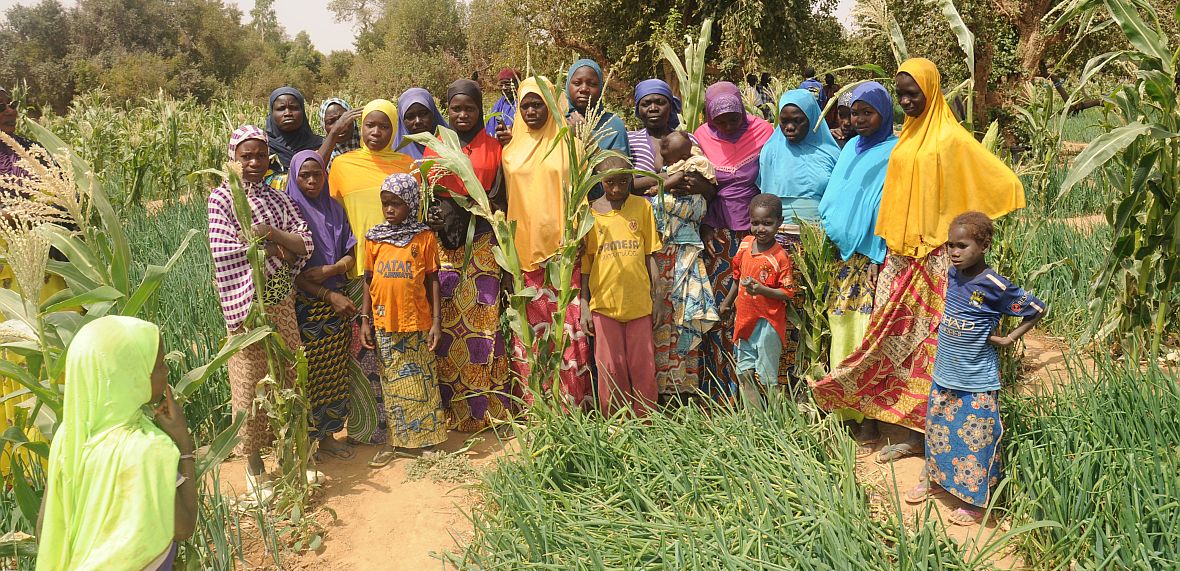 In addition to the equipment acquired and made available, the mission found that the beneficiaries had been sensitized and trained in certain vegetable gardening techniques and in community life. Interviews were conducted with the President and some members of the women's group and one of the few men who accompany them in their activities.
In addition to the equipment acquired and made available, the mission found that the beneficiaries had been sensitized and trained in certain vegetable gardening techniques and in community life. Interviews were conducted with the President and some members of the women's group and one of the few men who accompany them in their activities.

 The site is totally green with several vegetable crops (maize, cabbage, onions and salad). Producers report having suffered from the attack of insects that nearly destroyed part of the crops. If they welcome all that has been achieved and welcome the supporting partner organizations, their biggest concern now is the conservation of the onion that will be produced. They are looking for good wills to help them in this direction.
The site is totally green with several vegetable crops (maize, cabbage, onions and salad). Producers report having suffered from the attack of insects that nearly destroyed part of the crops. If they welcome all that has been achieved and welcome the supporting partner organizations, their biggest concern now is the conservation of the onion that will be produced. They are looking for good wills to help them in this direction.
Although at the beginning there were only about ten women, the success of the operation attracted many more women bringing the number to over 80 so far making the site too cramped to contain everyone.
An extension is made beside but which lacks the security and the installations of the pilot site.

A cereal processing unit of the Liptako Gourma "Potol" group in Torodi was also visited. This unit allows the occupation of nearly 70 women in the processing of rice, cowpea, sorghum into couscous, deguè, niéri (mixture of beans and rice). These products are marketed and highly prized by the population.
Farmers’ Field School (FFS)
In Gardi Beri and Koygolo, the 2nd sites, the support consists in accompanying the Ministry of Agriculture in the realization of its new concept of Farmers’ Field School (FFS) for the popularization of techniques and production practices appropriate to the management of water resources in the scarcity of the resource following the long drought cycle.
The stated objective of this action is to assist four (4) market gardening groups to adopt a community-based, participatory field learning process that leads to better understanding, adaptation and eventual improved agro-pastoral practices which, in turn, create a trend towards increased productivity and improved livelihoods, as well as food and nutrition security.
Each FFS brings together 32 women with whom consultations have led to the identification of a site where concrete practical gardening experiments are discussed with weekly sessions during which practical exercises are carried out on the crops. These market gardening experiments are mainly based on Agro-Ecosystem Analysis, which involves certain practices such as systematic observation, learning by discovery, critical analysis, collective decision-making.
Three of these sites are in the village of Gardi Beri and the 4th in Koygolo. At each site, the mission could interview the women who were well mobilized.
Main results
- Women master market gardening techniques with great enthusiasm and dedication as a guarantee of the appropriation of the project and the perpetuation of the gains on the ground;
- Successful four (4) "Farmers’ Field Schools" set up. The beneficiaries are mastering the techniques of managing the plots, monitoring the evolution of the plants and are ready to adopt them in their own sites to improve crop yields;
- Both experiences in Torodi and Dosso support the concerns of the country's national development programs, notably the Farmers’ Field Schools (Champs Ecole Paysans), which reinforces their impact and gives more chances of duplication of achievements at a larger scale;
- The CWP has built good relationships and left responsibility for the implementation of actions to the various national actors and has taken on a supervisory role, giving higher chances of success and appropriation.

